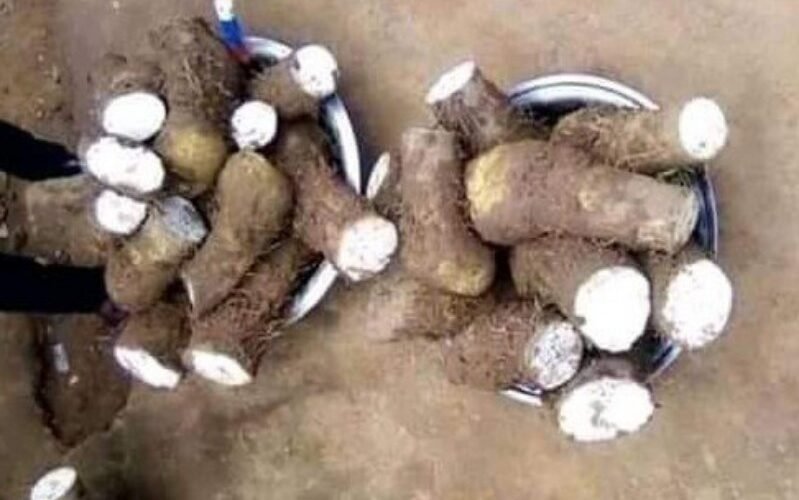Yam is a vital crop in Ohafia land. It’s the King of crops. The Guardian Deity of the Yam is known as Nfijioku.
Nfijioku is a feared and respected Deity. Rituals are made in honor of her. She is prayed to for productivity during farm season.
The particular paternal lineage (Umudi) responsible for serving Nfijioku is known as”Nde-Ezhe-Ji”
Nde EZhe-Ji are men only, their Chief Priest is known as Ezhe-Nde-Ezhe-Ji.
At the death of the Chief Priest, the lineage (Umudi) will appoint another Chief Priest who will carry on the work of the Chief Priest. So it goes from generation to generation
Nde-Ezhe-Ji played a vital role at the beginning and the end of the farm season.
At the beginning of every farm season, the Chief priest(Ezhe-Nde-Ezhe-Ji) and his group(Nde-Ezhe-Ji)perform rituals in honoring Nfijioku and in a request for productivity.
After performing rituals in honor of Nfijoku comes Ibieriri Ofia. Ibieriri Ofia is a tradition where Nde-Ezhe-Ji will go and clear some parts of their farm portion, then take a jar of palm wine and some amount of money to the Kindred who owns the farmland to renew their farm portion.
Thereafter, the King (Ezhe-Ogo) and his council through the town crier will announce that everyone should go ahead to acquire, renew and register their farm portions with the land owners.
Subsequently, everyone will start clearing their farm portions.
In the 3rd month of the year (March), the King and his cabinet through the town crier will announce the day to set fire to the cleared farmland, and on that day the villagers will go and burn the farmland for cultivation while they wait for Nde-Ezhe-Ji to cultivate their Yam before they will start planting crops in their farms.

If Nde-Ezhe-Ji did not cultivate their Yam, no one will cultivate in the general farmland, and burnt firewood(nku-ochu) from the burnt farmland, or somewhere else is not brought home for use. Bringing burnt firewood home attracts a fine.
First or second rain after the farmland is burnt, Nde-Ezhe-Ji will cultivate their Yam, thereon, everyone in the community can start planting crops on their farm portion and bring burnt firewood home for use. It is called Imepe-Ogo.
After Imepe-Ogo, Nde-Ezhe-Ji has no other event till the 8th month of the year (August) when it is time for them to harvest, eat, and celebrate new yam. Once they are set to eat new yam, No burial will hold, No ceremony of any kind, Churches are not allowed to use musical instruments, town crier will stop the use of the gong (Ogele) to call for the attention of the villagers before passing an important message to them, No fighting, No quarrel, No unnecessary noise, No violent of any kind. Most importantly, No one harvest or eat new yams before Nde-Ezhe-Ji. Anyone who goes contrary to the laws will pay dearly.
A day before they harvest their Yam, they will visit their farm two times to check if their Yam is due for harvest and to harvest other crops from their farm, this process is called Gbadugbadu Nde-Ezhe-Ji.
Gbadugbadu Nde-Ezhe-Ji is the most entertaining and interesting part of their events as they will be walking gently and majestically in a single line, playing music with their local musical instruments such as gong (Ogele)and others. The Chief Priest will be the number one man in the line, holding ” Ōfō-Nde-Ezhe-Ji”.
“Ōfō-Nde-Ezhe-Ji” is a sacred staff typically six to seven inches long, made of sacred wood like Ogirishi/Aboshi, red material, and cowries. it is a symbol of Authority, Leadership, and Power. Its work is to detect and expose anyone who stole or Abuse Yam in the previous farm season and anyone who directly or indirectly violent the rules that guild Nde-Ezhe-Ji.
Another person in the line will carry their “Abō” on his head.
Abō is an ancient basket in a triangle shape that contains their farm tools.
Some in line will dress funny, some will hold funny objects and some will be acting funny, but no matter how funny they may act or dress, the people who came out to view them are not expected to laugh as laughing at the scene attract a fine, The viewers are also not expected to go closer to them or walk past them, they can only watch them from a distance, going closer to them or closing their line attract a penalty. The viewers are not expected to follow them to an extent. No one is expected to meet them on their way to the farm or see them on the farm or meet them on their way back home.
During this season, the villagers are conscious of the time, and people who have something to do outside their homes leave very early and return home ahead of Nde-Ezhe-Ji. Children are warned by their parents to mind their movements to avoid getting themselves and their family members into trouble.
The next day after Gbadugbadu, they will still walk gently and majestically in a single line, playing music with their local musical instruments, going to their farm to harvest their Yam. When they get to their farm and harvest their Yam, they will wait till the night before entering the village,
while they are entering the village, No one will be on the road, and everywhere will be so quiet, everyone will be in their homes, and people living in their neighborhoods will not on even have their lamps on. This is because no one is expected to see them or the size of their Yam until they present it to Nfijioku.
If their Yam comes out big, they will indicate with their music, if otherwise, they will also indicate with their music.
When they present their Yam to Nfijioku and do other necessary things they have to do, they will invite people to come and see their Yam and celebrate with them.
That day used to be remarkable, as it was used to mark the end of farm season and the end of the year in the Ohafia calendar.
The villagers will come out with burning firewood(Orefōrō) shouting “Afo gbara aka laoooo”
Casting out bad things and starvation that have happened and ushering in good things and fruitful seasons.
Some people will rearrange their homes, trash their leftover food, old clothes, old utensils, and spoilt stuff in their homes because they don’t want to start a new era with old things.
After this, everybody can harvest and eat new Yam.




















